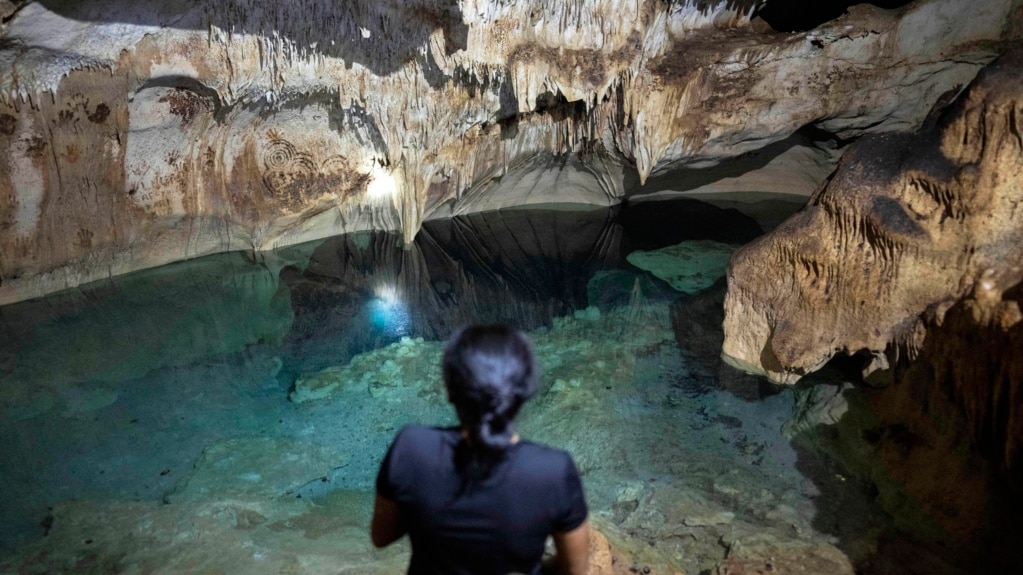In the Mexican state of Yucatan, hundreds of underground lakes form a semicircular shape in the northwestern part of Yucatan state. They are called the Ring of Cenotes. The lakes provide water for the area, but they are also part of a dispute between local people and pig farmers.
The cenotes are also important to local people who earn a living by leading foreign visitors into the caverns to swim and explore.
Maribel Ek lives in the community of Homun, near the cenote known as Santa Maria. To native Mayans like Ek, cenotes are holy. She calls the Sant Maria cenote her "neighbor."
That belief is behind a legal action, or lawsuit, that aims to have the Ring of Cenotes legally recognized as a person. Personhood would give the lakes the same rights and protections of law that human citizens have.
A Mayan organization called Guardians of the Cenotes has brought the lawsuit. It aims to keep large pig farms out of the area because they are affecting the water quality of the underground lakes.
If the group wins, the lakes will become the first ecosystem in Mexico to be considered a person. There have been other such cases worldwide, such as the Whanganui River in New Zealand or the Komi Memem River in the Brazilian Amazon.
Ek is a member of the Guardians group.
Polluting the waters
The threats to cenotes have been growing. Cities in Yucatan are growing and there are new breweries and soybean fields in the area. But what most worries the Guardians of the Cenotes are the pig farms.
Mexico's Ministry of the Environment reports that 507 pig farms are operating near the Ring of Cenotes. There is little to no control over what happens to the thousands of liters of water containing pig waste from the farms.
Yameli Aguilar is a biologist from the Autonomous University of Yucatan. He said the polluted water goes into the aquifer.
A study carried out last year by the Ministry of the Environment found E. coli bacteria in 20 cenotes near pig farms.
The state has named the land a natural protected area, and it is an important wetland. Lourdes Medina is a lawyer who represents the Guardians in the legal case. She said the government still has failed to prevent “serious contamination” from taking place.
Ek and others created the Guardians of the Cenotes group to lead the fight against one pig farm built near Homun in 2017. They organized protests and legal actions without any effect. A year later, six children from Homun brought a case demanding their right to water and a healthy environment. A judge ordered the farm closed.
In 2022, the group began its personhood legal action. If successful, it would affect 52 communities within the Ring of Cenotes. A Yucatan state judge has ordered officials not to give permission to any project that could affect the area until the lawsuit is settled.
That could happen at the beginning of next year.
What do the pig farmers say?
Pig farms and other large industries come to the area because of the availability of water. The farms use a lot of water to cool the animals and clean their waste.
The industry says it is not causing the contamination. Carlos Ramayo Navarrete is director of the Pig Farmers Association in Merida. It represents the largest pig farms in Yucatan. He said the problem comes from a lack of drainage systems in cities and small pig farmers. Navarrete said small pig farms are not as officially regulated as the big farms he represents.
He said around half the water the farms use is reused. In addition, he said all of the farms have treatment systems to reduce pollution in their wastewater. The remaining water is then used as fertilizer.
However, both the Ministry of the Environment and Aguilar, the biologist, have said that the measures taken by the industry are still not enough.
What will the future bring?
Back in Homun, Maribel Ek enjoys swimming in the waters of the cenote. She said that she has learned the cenote is "a blessing, a dark hole that becomes a friend," and she added "That's why we demand rights for our cenotes."
I’m Jill Robbins.

